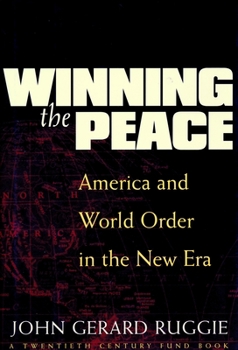Winning the Peace: America and World Order in the New Era
Select Format
Select Condition 
Book Overview
-- Foreign Affairs
Format:Paperback
Language:English
ISBN:0231104278
ISBN13:9780231104272
Release Date:April 1998
Publisher:Columbia University Press
Length:288 Pages
Weight:0.70 lbs.
Dimensions:0.5" x 5.9" x 8.9"
Grade Range:Postsecondary and higher
Customer Reviews
1 rating
An innovative and refreshing synthesis of IR studies
Published by Thriftbooks.com User , 26 years ago
Reviewed by Vladimir Matveyev in International Relations, Volume XIII, No 5, August 1997 This is one of the growing mountain of books whose authors, at the turn of the century, attempt to foresee the course of international events in the twenty-first century. John Ruggie, professor of political science and international affairs at Columbia University, unlike most of his colleagues writing on the subject, refrains from predicting changes of a radical, extraordinary or even puzzling kind. He seeks solutions for the future neither in a prognosis of a clash of civilizations, as Samuel Huntington does, nor in a restoration of isolationist foreign policy approaches which has recently become a credo for Republican candidates for Congress and the White House. Similarly, disclaiming a doctrine of `political realism' as inapplicable in the realities of post-Cold War international relations, he formulates his symbol of faith as the need to return to the foreign policy values of Franklin Roosevelt, Harry Truman and partly of Dwight Eisenhower - in other words, of the generation that changed America's role in the world. This remarkable group of men, the author argues, managed to combine a reformist foreign policy agenda (inherited from Woodrow Wilson) with an understanding of power - the political realities of the world. He also advises a thorough examination of the institutional legacy that this generation left, and the need to reflect upon ways of applying it to the formulation of present and future US foreign policy objectives. In his key chapter entitled `Cooperative Security', Professor Ruggie suggests that the three pillars, i.e. NATO, the United Nations and the Organization for Security & Cooperation in Europe (OSCE), should remain the main institutional bodies for the realization of US aims in international relations. He also adds that certain opportunities exist in East Asia for a modest security construct. In contrast to his neo-isolationist opponents, Professor Ruggie views these bodies as the primary instruments of effective international cooperation and urges an active and constructive US role in them. Advocating greater American participation in UN activities and referring, in particular, to the high esteem of the United Nations in American society as shown by recent public opinion polls, Professor Ruggie strongly disagrees with the 1994 Republican Party platform which sought to restrict effective US participation in UN peace operations. He also considers it necessary for Congress to meet America's financial obligations to the UN - US arrears now exceed one billion dollars. With regard to NATO, the author states that it `will have a significant role to play in the new era only if policy-makers view it as its founders intended: an instrument of deterrence and defense, to be sure, but also of transformation'. He stresses that in order to become an effective international body aimed at cooperation, NATO should pursue a far broader set of object






